23 April
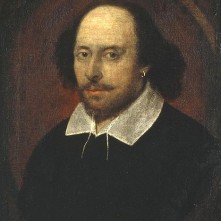
William Shakespeare
1500 – Birth of Alexander Ales (Alesius, Aless), Scottish theologian and reformer, at Edinburgh. His mother was Christina Bigholm, and his actual surname seems to have been Alan or Allane. He changed his name when he went into exile, choosing “Alesius”, meaning “bird”, or in this case, “exile”.
1512 – Birth of Henry Fitzalan, 12th Earl of Arundel, son of William Fitzalan, 11th Earl of Arundel, and Anne (née Percy), daughter of Henry Percy, 4th Earl of Northumberland. At his baptism, Henry VIII stood as his godfather. He served Henry VIII as Deputy of Calais, Privy Councillor and Lord Chamberlain.
1536 – Sir Nicholas Carew was elected to the Order of the Garter at the annual chapter meeting at Greenwich, rather than George Boleyn, brother of Queen Anne Boleyn.
1564 - Traditional birthdate of William Shakespeare, the Bard. It is not known on what date Shakespeare was actually born but he was baptised at Stratford-upon-Avon on 26th April 1564, and baptism usually took place around three days after birth. Click here to find out more about Shakespeare.
William Shakespeare also died on this day in 1616. He was buried at the Holy Trinity Church, Stratford-upon-Avon, in the chancel.
23 April, St George's Day, was the traditional day for announcing new appointments to the Order of the Garter, the highest order of chivalry in England. Click here to read more about the Order of the Garter.
24 April
1536 – Commissions of oyer and terminer set up by Thomas Audley, Lord Chancellor. These particular commissions were for offences committed in the counties of Middlesex and Kent, and covered the crimes of misprision, treason, rebellion, felonies, murder, homicide, rioting, plotting, insurrection, extortion, oppression, contempt, concealment, ignorance, negligence, falsities, deception, conspiracy and being an accessory to these crimes. It is not known whether they were set up specifically to try the men who would later be charged with committing adultery with Queen Anne Boleyn.
1545 – Baptism of Henry Wriothesley, 2nd Earl of Southampton, at St Andrews, Holborn. He was the son of Thomas Wriothesley, 1st Earl of Southampton and 1st Baron Wriothesley, Henry VIII's Lord Chancellor.
1549 – Death of Ralph Neville, 4th Earl of Westmorland, English peer, soldier and Privy Councillor. He was buried at Staindrop in County Durham. Neville was one of the peers who sat in judgement on Anne Boleyn in May 1536 and served Henry VIII as a soldier in the North of England and borders, and Edward VI in Scotland.
1551 – Execution of Dutchman George van Parris, surgeon and religious radical at Smithfield. He was burned at the stake for Arianism (denying the divinity of Christ).
1555 – Burning of George Marsh, Protestant martyr, former curate at All Hallows Church, London and a preacher in Lancashire, at Spital Boughton outside the walls of Chester. He had refused the offer of a royal pardon if he would recant his Protestant faith. His ashes were buried in the St Giles cemetery.
1558 - Mary, Queen of Scots married Francis, the Dauphin of France, at Notre Dame in Paris. Mary was fifteen, and Francis was fourteen.
25 April
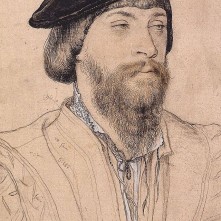
Thomas, Lord Vaux
1509 – Birth of Thomas Vaux, 2nd Baron Vaux, poet associated with Sir Thomas Wyatt and Henry Howard, Earl of Surrey.
1513 – Death of Sir Edward Howard, naval commander, by drowning, in an attack on the French fleet. Edward was the second son of Thomas Howard, 2nd Duke of Norfolk.
1526 – Death of Charles Somerset, 1st Earl of Worcester, illegitimate son of Henry Beaufort, 2nd Duke of Somerset, and his mistress Joan Hill. He was buried in St George's Chapel, Windsor.
1536 - King Henry VIII wrote letters to his ambassadors abroad: Richard Pate in Rome, and Stephen Gardiner and John Wallop in Paris. In these letters, he referred to Anne Boleyn as “our most dear and most entirely beloved wife the Queen” and wrote of his hope for a son. Click here to read more.
1544 – Publication of Queen Catherine Parr's English translation of John Fisher's "Psalms or Prayers". It was published anonymously. Click here to read more.
1551 – Death of Alice More, Lady More, second wife of Sir Thomas More. Her exact date of death is not known, but it was around 25th April 1551. She was buried at Chelsea.
1557 – “A Masque of Almains, Pilgrims and Irishmen” was performed in front of Queen Mary I and Philip of Spain.
1557 - Thomas Stafford, son of Henry Stafford, 10th Baron Stafford, and Ursula Pole, seized Scarborough Castle, declared himself “The Lord Thomas Stafford, son to the Lord Henry, rightful Duke of Bokingham” then proclaimed himself “Protector of the Realm”. He also denounced Mary's marriage to Philip and warned the people that they would be made slaves by the Spaniards, thus inciting rebellion. He was executed on 28th May 1557.
1599 – Birth of Oliver Cromwell, future Lord Protector of England, Scotland and Ireland.
1603 – Burial of Katherine Howard, Countess of Nottingham, eldest daughter of Henry Carey, 1st Baron Hunsdon, at All Saints, Chelsea. Elizabeth I was said to be very distressed at her friend's death.
26 April
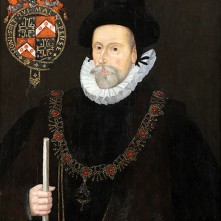
Francis Knollys
1536 - Queen Anne Boleyn met with her chaplain, thirty-two-year-old Matthew Parker, and made him promise to do something for her. Click here to read more.
1540 – Marriage of Francis Knollys and Catherine Carey, daughter of Mary Boleyn and William Carey, or, as some historians believe, Henry VIII.
1546 – Death of Sir Ralph Ellerker, soldier, in a French ambush while serving as Marshal of Boulogne for Henry VIII. He was buried in St Mary's Church in the town.
1564 – Baptism of William Shakespeare at Holy Trinity Church, Stratford-upon-Avon. Shakespeare was the third son of John Shakespeare, a glover and whittawer, and Mary Arden, who lived in Henley Street, Stratford-upon-Avon.
1589 – Death of Andrew Perne, Dean of Ely and Vice-Chancellor of Cambridge University, at Lambeth while visiting his friend, Archbishop John Whitgift. He was buried at Lambeth Parish Church.
1596 – Burial of Henry Hastings, 3rd Earl of Huntingdon, at St Helen's Church, Ashby-de-la-Zouch.
27 April
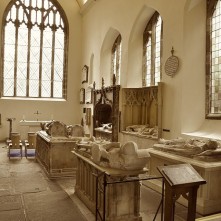
Lewis Chapel, St Mary's Church, Abergavenny.
1536 - Writs were issued summoning Parliament and a letter sent to Thomas Cranmer, Archbishop of Canterbury, asking him to attend. Click here to read more.
1536 - John Stokesley, Bishop of London, was approached regarding whether Henry VIII could put aside his second wife Anne Boleyn. Click here to read more.
1584 – Death of David Lewis, civil lawyer and judge involved in the maritime cases of Elizabeth I's reign. He was buried in St Mary's Church, Abergavenny, in the part of the church now known as the Lewis Chapel.
1609 – Death of Sir Edward Michelborne, member of Parliament, soldier and adventurer, after becoming ill in January that year. In James I's reign, he obtained a royal licence “to discover the countries of Cathay, China, Japan, Corea, and Cambaya, and to trade there”, and he set sail on 1st December 1604, returning in July 1606 after time spent plundering Dutch settlements in Indonesia. He was buried in Hackney.
28 April
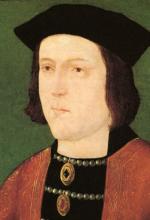
Edward IV
1442 – Birth of Edward IV at Rouen, Normandy. Edward was the son of Richard, 3rd Duke of York, and Cecily Neville, and was King of England from 1461 to 1470, until he was overthrown by the Earl of Warwick who restored Henry VI, and then from 1471 to his death in 1483.
1489 – Death of Henry Percy, 4th Earl of Northumberland, magnate. He was killed when he confronted protesters at South Kilvington, near Thirsk, and his retainers failed to defend him. His unpopularity had been caused by his actions, or rather inaction, at the Battle of Bosworth, when he chose to keep his retainers out of the battle and Richard III, who his people supported, was defeated and killed.
1533 – Death of Nicholas West, Bishop of Ely, diplomat and former Chaplain to Catherine of Aragon, at his manor in Downham. He was buried in Ely Cathedral, in the chantry chapel that he had built. West got into trouble in 1530, actually being charged with praemunire, for his support of Catherine of Aragon and, therefore, opposition to Henry VIII's policies. He was imprisoned briefly.
1536 – Reports of council meetings and Thomas Cromwell's meeting with Dr Richard Sampson aroused suspicion.
1548 – Death of Sir Anthony Browne, courtier and Keeper of Oatlands Palace, at Byfleet, Surrey. Browne was involved in Anne Boleyn's downfall, reporting that his sister, the Countess of Worcester, had told him that Anne had committed adultery and possible incest. Browne was also the one who informed King Henry VIII that he was dying.
1556 – Execution of Richard Uvedale at Tyburn for his involvement in Henry Dudley's plot against Mary I.
1558 – Execution of eighty-two year old Walter Mylne, priest and Protestant martyr, for heresy at St Andrews, Scotland. So appalled at the planned burning of this aged man were the townsfolk that they refused to provide materials for the burning, and Mylne had to be escorted to the stake by armed guard.
1572 – Burial of William Paulet, 1st Marquis of Winchester, administrator and nobleman. He was buried at Basing. Under Henry VIII he was Lord Great Chamberlain, Great Master of the Household, Lord President of the Privy Council and Lord Treasurer. He also served Edward VI, Mary I and Elizabeth I as Lord Treasurer.
1580 – Baptism of William Herbert, 3rd Earl of Pembroke, courtier and patron of the Arts, at St Mary's Church, Wilton, Wiltshire. Herbert was Chancellor of Oxford University and Broadgates Hall honoured him for his patronage and financial support by changing its name to Pembroke College.
1603 - Elizabeth I’s funeral took place in London. Click here to read more about it.
29 April
1500 – Birth of William Dacre, 3rd Baron Dacre of Gilsland and 7th Baron Greystoke. He was the eldest son of Thomas Dacre, 2nd Baron of Gilsland, and Elizabeth Greystoke, Baroness Greystoke. He was married twice, to Lady Elizabeth Talbot and then to Anne Hastings. His offices included Captain of Norham Castle, Steward of Penrith, Warden of the West Marches, Governor of Carlisle and Warden of the Middle Marches. He died on 18th November 1563.
1536 – Anne Boleyn argued with Sir Henry Norris, rebuking him with the words “You look for dead men's shoes, for if aught came to the King but good, you would look to have me” and thereby speaking of the King's death, something that amounted to treason. When she realised her mistake, Anne instructed Norris to go to her almoner the next day and take an oath that she “was a good woman”.
1579 – Death of Richard Cheyney, Bishop of Gloucester, at The Lodge in Painswick, Gloucestershire, the bishop's manor. He was buried in his cathedral.
1594 – Death of Thomas Cooper, Bishop of Winchester and theologian, at Winchester. He was buried in his cathedral, on the south side. Cooper's works included “Cooper's Chronicle”, Thesaurus Linguae Romanae et Britannicae and “An Admonition to the People of England”, which was directed against Puritans.
1617 – Death of Sir Dru Drury, courtier, member of Parliament, friend of Thomas Howard, 4th Duke of Norfolk, and Lieutenant of the Tower of London (1595-6), at Riddlesworth Hall in Norfolk. In 1586, Drury and Sir Amyas (Amias) Paulet were chosen to supervise Mary, Queen of Scots during her imprisonment. He was buried in Riddlesworth Parish Church.

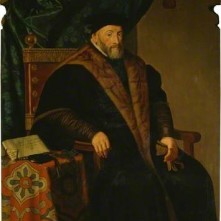

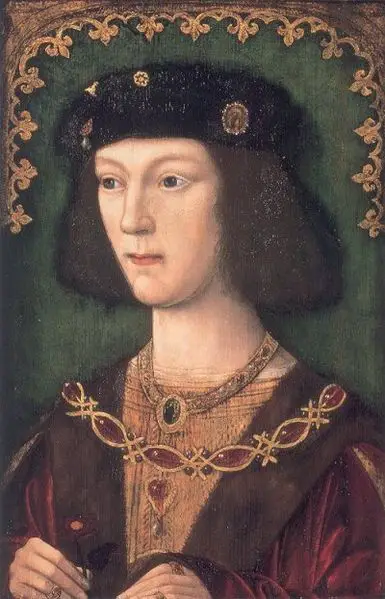
Leave a Reply